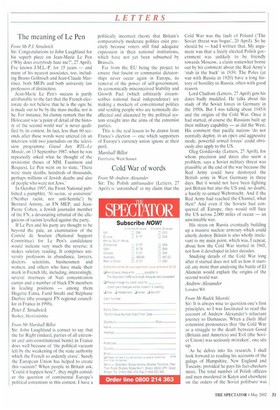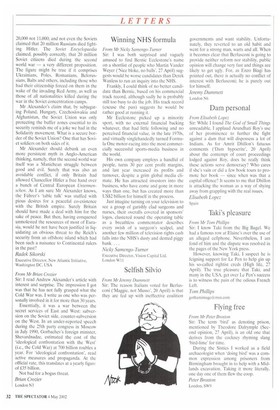Cold War of words
From Mr Andrew Alexander Sir: The Polish ambassador (Letters, 27 April) is 'astonished' at my claim that the Cold War was the fault of Poland (The Soviet threat was bogus'. 20 April). So he should be — had I written that. My argument was that a freely elected Polish government was unlikely to be friendly towards Moscow, a claim somewhat borne out by his comment about the Red Army's 'stab in the back' in 1939. The Poles (at war with Russia in 1920) have a long history of hostility to Russia, often with good reason.
Lord Chalfont (Letters. 27 April) gets his dates badly muddled. He talks about his study of the Soviet forces in Germany in the 1950s. But I was talking about 1945/6 and the origins of the Cold War. Once it had started, of course the Russians built up their military capability — as did the West. His comment that pacific nations 'do not normally deploy, in an open and aggressive mode, powerful armed forces' could obviously also apply to the US.
Oleg Gordievsky (Letters, 27 April), for whom precision and dates also seem a problem, says a Soviet military threat was plausible at the end of the war because the Red Army could have destroyed the British army in West Germany in three days. But it would not have been fighting just Britain but also the US and, no doubt, a hastily re-armed Wehrmacht. And if the Red Army had reached the Channel, what then? And even if the Soviets had conquered all Europe, they would still face the US across 2,000 miles of ocean — an unwirmable war.
His stress on Russia eventually building up a massive nuclear armoury which could utterly destroy Britain is also wholly irrelevant to my main point, which was, I repeat, about how the Cold War started in 1945, not how it developed in later decades.
Studying details of the Cold War long after it started does not tell us how it started, any more than analysing the battle of El Alamein would explain the origins of the second world war.
Andrew Alexander
London W8
From Mr Radek Sikorski Sir: It is always wise to question one's first principles, so I was fascinated to read the account of Andrew Alexander's reluctant journey to Damascus. When a Daily Mail columnist pronounces that 'the Cold War as a struggle to the death between Good (Britain and America) and Evil (the Soviet Union) was seriously mistaken', one sits up.
As he delves into his research, I shall look forward to reading his accounts of the gulags of Hampshire, New England and Tuscany, provided he pays his fact-checkers more. The total number of Polish officers and men murdered in Katyn and elsewhere on the orders of the Soviet politburo was 20,000 not 11,000; and not even the Soviets claimed that 20 million Russians died fighting Hitler. The Soviet Encyclopaedia claimed, possibly correctly, that 20 million Soviet citizens died during the second world war — a very different proposition. The figure might be true if it comprises Ukrainians, Poles, Romanians, Belorussians, Baits and others, including those who had their citizenship forced on them in the wake of the invading Red Army, as well as those of all nationalities killed during the war in the Soviet concentration camps.
Mr Alexander's claim that, by subjugating Poland, Hungary, Czechoslovakia and Afghanistan, the Soviet Union was only protecting the buffer zones essential to its security reminds me of a joke we had in the Solidarity movement. What is a secure border of the Soviet Union? One that has Soviet soldiers on both sides of it.
Mr Alexander should debunk an even more persistent myth in Anglo-American thinking, namely, that the second world war itself was a Manichean struggle between good and evil. Surely that was also an avoidable conflict, if only Britain had allowed Chancellor Hitler a free hand over a bunch of Central European Untermenschen. As I am sure Mr Alexander knows, the Fiihrer's 'table talk' was stuffed with pious desires for a peaceful co-existence with the British empire. Surely Britain should have made a deal with him for the sake of peace. But then, having conquered unmolested the resources of most of Eurasia, would he not have been justified in liquidating an obvious threat to the Reich's security from an offshore island which had been such a nuisance to Continental rulers in the past?
Radek Sikorski
Executive Director, New Atlantic Initiative, Washington DC, USA
From Mr Brian Crozier Sir: I read Andrew Alexander's article with interest and surprise. The impression I got was that he has not fully grasped what the Cold War was. I write as one who was personally involved in it for more than 30 years.
Essentially, it was a war between the secret services of East and West: subversion on the Soviet side, counter-subversion on the West. In an under-reported speech during the 25th party congress in Moscow in July 1990, Gorbachev's foreign minister, Shevardnadze, estimated the cost of the 'ideological confrontation with the West' (i.e., the Cold War) at 700 billion roubles a year. For Ideological confrontation', read active measures and propaganda. At the official rate, this translates at a yearly figurc of £35 billion.
Not bad for a bogus threat.
Brian Crozier
London N3







































































 Previous page
Previous page